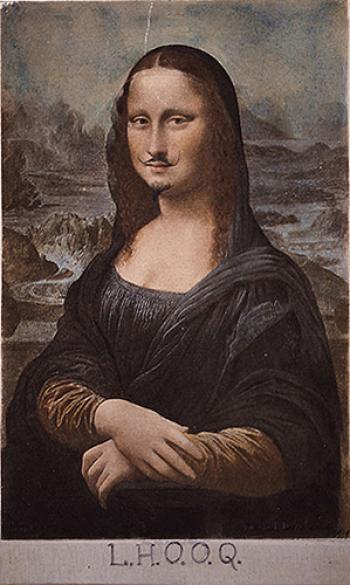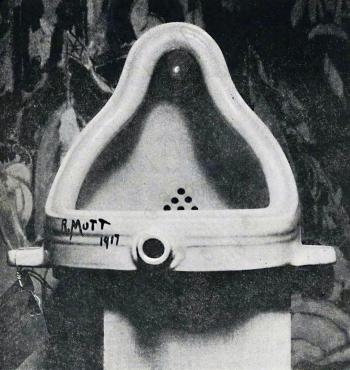Serendip is an independent site partnering with faculty at multiple colleges and universities around the world. Happy exploring!

Waking Life Movie Quote
"I had a friend once who told me that the worst mistake that you can make is to think you are alive, when you're really asleep in life's waiting room. The trick is to combine your waking rational abilities with the infinite possibilities of your dreams. 'Cause if you can do that you can do anything."

Research based on Critical Play
After reading "Critical Play", I did ten minutes of research on Dada art. I remembered enjoying learning about it in a High School Art History class, and seeing the name again in the reading piqued my interest. I enjoyed reading about how the artistic movement occured as a result to World War I, and the nationalistic tendencies that led to the war. I also learned how Dada artists opposed all norms, including Dadaism itself, and many Dada artists proclaimed "Dada is anti-Dadaism". Dadaism was the rejection of artistic and cultural authority, and consisted mainly of a group of artists asking "what is art?". My favorite Dada artist is Marcel Duchamp, who is famous for many pieces, including "fountain", a sculpture which he created by turning a urinal on its side. Duchamp rejected all painting because he believed it to be made for the eye, rather than the mind. He showed this rejection in his general medium use of sculpture, but also in a piece he made, in which he drew a moustache on a print of Leonardo da'Vinci's "Mona Lisa". He named this piece "L.H.O.O.Q", which, in French, means something along the lines of "she has a hot @$$". This defacement of such a famous artwork shows the "in your face" attitude of the Dada movement.



Another Life in A Virtual World
Like tomahawk mentioned, Flanagan's passage made me remember of a ted talk one of my friend's made back in highschool of the effect of videogames. Personally, I'm not a videogamer neither and I wasn't really a fan of people playing videogames either. My brothers and sister play and never seem to take interest in any physical activity, which really annoyed me. I never grasped why most people loved playing videogames. Medrano, my friend explained, like Flanagan, that videogames are a way for people to escape reality and become people they've always hope to become or wish to become. It's a virtual world created for people to escape the stress and frustration and relax. In the real world, we can't become the top gansters of L.A. and get every cute girl, but in L.A. Noire, we most definitely can. In SIMS, we play another life, no violence, no physical activity, simply participate in another life through a virtual world. Videogames are essential, although most people consider it pointless, they're a way for people to cope with stress and live a virtual different life.

Innovating Pedagogy 2013: Badges to accredit learning
The Innovating Pedagogy report is an annual overview of edutech from the Institute of Educational Technology at the Open University. The 2013 report, the second in the series, selects 10 emerging innovations from the long list of existing technologies which the institute believes have the potential to make a significant impact on education. These are not technologies which are in development or even new, but rather technologies and ideas which are already being effected but have room to expand. The report ranks each innovation in terms of potential impact and timescale for implementation, describes its current application, and then explains the pedagogy behind the innovation and how it could be re-envisioned for maximum impact. The second innovation the report describes is the use of badges to accredit learning.
Potential impact: high
Timescale: medium (2-5 years)

Allan Kaprow
While looking through Chapter 5 of Critical Play by Mary Flanagan I became interesed in an artist who was mentioned only briefly. His name is Allan Kaprow and it is his work that coined the term Happening, something we all experienced a few weeks ago.
A Happening is a work that is shaped through audience participation. It creates a narrative through interactions of the participatnts and the Environment. The Environment is the space where the work occurs that encompasses everything that is needed for the work- people need only enter for it to begin.
Kaprow's most famous work is "18 Happenings in 6 Parts". Reading about this work reminded me of "The Quiet Volume". It involves participants moving through a series of three rooms while following the direcctions written on three cards and the sound of bells to indicate when to move on.



"Gaming can make a better world"
The Introduction to Flanagan's "Performative Games and Objects" reminded me of this ted talk. Check it out if you've got some spare time!
http://www.ted.com/talks/jane_mcgonigal_gaming_can_make_a_better_world.html

Innovating Pedagogy 2013: MOOCs
The Innovating Pedagogy report is an annual overview of edutech from the Institute of Educational Technology at the Open University. The 2013 report, the second in the series, selects 10 emerging innovations from the long list of existing technologies which the institute believes have the potential to make a significant impact on education. These are not technologies which are in development or even new, but rather technologies and ideas which are already being effected but have room to expand. The report ranks each innovation in terms of potential impact and timescale for implementation, describes its current application, and then explains the pedagogy behind the innovation and how it could be re-envisioned for maximum impact. The first innovation the report discusses are MOOCs or "Massive open online courses".
Potential impact: large
Timescale: short (1-2) years
Mission: Possible! Ed 255's jointly authored top 3 (or 4) priorities for inquiry
MISSION: POSSIBLE
OUR TOP THREE PRIORITIES FOR INQURY IN ED 255 IN STUDYING CONNECTIONS BETWEEN CONNECTING NETWORKED EXPERIENCES AND EDUCATION
Our class wrote these together. Feedback welcome!
1. Creativity and Structure. What are the relationships between learner- driven inquiry and organization, creativity and standardization, and how do online experiences interact with/inform/reflect these relationships? (EMERGENCE)
2. Access and Social Inequality. who has access to the Internet and who doesn’t? where? and to what (including e-labor and e-waste)? How do different people/groups create and use access? What do we need to know to think well about this and how it impacts high access spaces? (POWER)
3. Human Development. How do our growing/changing bodies and brains interact with and get shaped by networked experiences? Opportunities and opportunity costs? How is identity shaped and changed by (and shapes and changes) online, networked experiences? (IDENTITY)
4. Institutions and Communities?

The Committee of Sleep
As I mentioned in class, the Committee of Sleep, is a book discussing "dream incubation" and the various ways of problem solving in your dreams. Some of you might find strong connections to the movie, Inception.
Read this interesting wikipedia article for more information:
http://en.wikipedia.org/wiki/Dream_incubation


